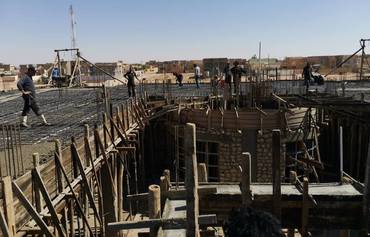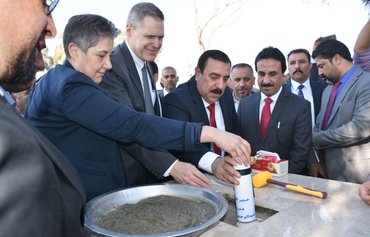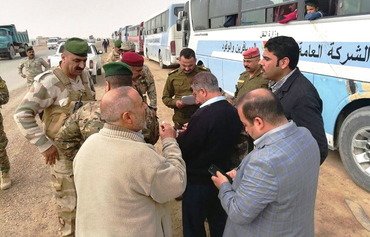Top priorities for Iraq's westernmost province in 2020 include moving ahead with reconstruction and continued security improvement, said Anbar governor Ali Farhan al-Dulaimi during an exclusive interview with Diyaruna.
Anbar's local government views the pursuit of "Islamic State of Iraq and Syria" (ISIS) remnants and the full restoration of security in the province as issues of "utmost importance", he said.
Al-Dulaimi stressed the importance of the work international coalition forces and international organisations such as the UN are doing to help Anbar residents.
He also made it clear that ISIS's days in the province are over, noting that the local population rejects the group and it will not be making a comeback.
Diyaruna: Is it possible to ascertain the extent of the damage that resulted from ISIS's occupation of the province, and the reconstruction and rehabilitation work that has been accomplished so far?
Ali Farhan al-Dulaimi: It is not news to anyone that Anbar is one of the Iraqi provinces that was devastated by terrorism and was among the hardest hit, in terms of the destruction inflicted on it during its occupation by ISIS and in the course of the military operations waged to liberate it. A full 80% of the province's infrastructure and the private property of its residents was damaged.
As for the loss of life, unfortunately it was very high: ISIS killed many people.
Reconstruction projects are continually being undertaken by the Iraqi authorities as well as the international community, represented by organisations such as the UN, in addition to the reconstruction team of the US-led international coalition. Though it only has a modest budget, the province is also undertaking reconstruction projects.
Today, we have reconstruction projects under way that are restoring roads and bridges to service, many of which we have completed. We also have rehabilitation projects focused on schools, hospitals and health centres. Through these initiatives, we are working on turning the page on ISIS for good.
Diyaruna: Some internally displaced persons (IDPs) have not yet returned to their homes. Why is that?
Al-Dulaimi: The number of IDPs who returned to the province in 2019 was very high compared to other provinces, but there were problems that prevented many more from returning. This included destroyed homes, lack of services and the presence of improvised explosive devices (IEDs) left behind by ISIS that pose a threat to both returning residents and security forces.
The international coalition has done a lot in this regard by removing mines, helping clear cities of IEDs and training Iraqi forces and civil defence personnel, to develop their skills in this area specifically.
Diyaruna: What about the security situation in Anbar in general?
Al-Dulaimi: We will soon lift the night curfew in Fallujah and Ramadi, and abolish the security card system, or what is known as the 'security slip', which was required to enter cities. There are excellent security-related operations being performed. Best of all, citizens are volunteering to assist security forces and the army by reporting suspicious activities and everything related to terrorism. This is probably the greatest achievement that has taken place in Anbar.
As for field operations, the police and army forces together make a great team and are on the same page in pursuing and arresting ISIS remnants in urban and rural areas and finding and destroying weapons and explosive caches.
Diyaruna: There have been complaints about delays in compensation for residents who suffered damages caused by ISIS or during the battles to oust the group.
Al-Dulaimi: Yes, this is completely true, but the number of those covered under the compensation law is very large, because of ISIS's criminality and what it did to the province. The compensation was based on Iraqi Law 20 of 2009, and is not commensurate with the current level of destruction. However, parliament voted to amend the law last month, and we are waiting for its implementation on the ground, at which time the compensation mechanism will be speedier and more streamlined in paying citizens compensation amounts that are commensurate with what they lost during ISIS's occupation and the liberation operations.
Diyaruna: Is there anything else you would like us to know?
Al-Dulaimi: Today, Anbar abounds with reconstruction and rehabilitation projects, and the province's cities are faring better each year. We value the efforts of everyone who assisted us, including the UN, international organisations and the international coalition, both for defeating ISIS and the rehabilitation and reconstruction works being undertaken in Anbar today.

![Anbar governor Ali Farhan al-Dulaimi, seen here in his office, recently sat down for an exclusive interview with Diyaruna. [Photo courtesy of Anbar governor's media office]](/cnmi_di/images/2020/03/11/22743-anbar-gov-iraq-600_384.jpg)






